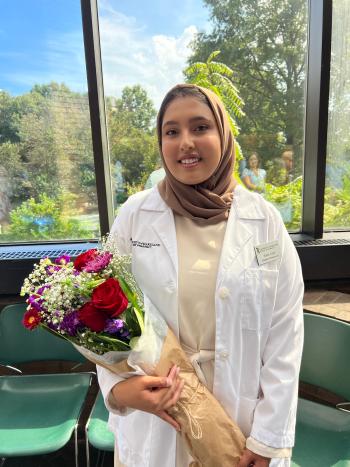Pharmacists can dispense and recommend medications prescribed by physicians and other healthcare providers, and help provide information and counsel to patients about medications and their use. They can also advise physicians and other healthcare providers on the selection of dosages, interactions, and side effects of medications. Pharmacists must understand the use, clinical effects, and composition of drugs, including their chemical, biological, and physical properties. They can work in hospitals, pharmacies, and other healthcare facilities. For more information, please see the Pharmacist profile in the Bureau of Labor Statistics’ Occupational Outlook Handbook.
A doctoral degree is required to become a pharmacist. Doctor of Pharmacy (Pharm. D.) degrees are generally 4 years long, and can be done in a “2+4”, “3+4”, or “4+4” program. Students must complete 2 years of prerequisite courses at an accredited college or university before they can apply for admission to Pharm. D. programs. However, students also have the option of completing these courses in 3 years, or as part of their Bachelors degree. While a Bachelors degree is not required prior to applying or matriculating to pharmacy school, students can apply to Pharm. D. programs after obtaining their Bachelor’s degree.
Student do not need to have a specific major in order to apply to Pharm. D. programs, and the University of Maryland does not offer a “pre-Pharmacy” degree or certificate. However, we do advise students who are interested in applying to Pharm. D. programs.
This is a helpful database, thanks to Manchester University, with many career options upon graduation with your Pharm. D.
While prerequisites vary slightly from school to school, common prerequisites can include (but are not limited to):
- General Chemistry (with lab)
- Organic Chemistry (with lab)
- Biochemistry
- General Biology (with lab)
- Calculus
- Statistics
- Physics
- Human Anatomy & Physiology 1 and 2
- Microbiology (with lab)
- English Composition
- Microeconomics
- Communications
In addition, there are many Minors that cover topics critical to expanding understanding of the various determinants of health. Coursework related to Diversity, Equity, and Inclusion can be helpful in developing cultural awareness, cultural humility, and an understanding of systemic discrimination in the health care system. Even if your academic plan does not permit adding a minor, it is worth reviewing the curated course lists for courses that will stretch you, increase your language for difference and disparity, show your intellectual curiosity, and improve your critical reasoning skills.
Download the 2022-2023 AACP Course Prerequisites Summary (PDF) to learn how admission requirements overlap across Pharm.D. programs. Students can also use the American Association of Colleges of Pharmacy’s Pharmacy School Locator to look at specific prerequisite courses for different schools. Watch a new video tutorial to learn how to best use this tool to sort, filter, and compare Pharm.D. programs. It should be noted that some Pharmacy schools accept AP credits, and some do not for specific prerequisite coursework. Students should always check with specific schools to ensure they meet the requirements.
To apply to Pharm. D. Programs, students need to take the Pharmacy College Admissions Test (PCAT), which has five sections:
- Writing
- Biological Processes
- Chemical Processes
- Critical Reading
- Quantitative Reasoning
While not required at all schools, gaining pharmacy experience can also be helpful for applications. One of the best ways of doing so is by becoming a Pharmacy Technician. In order to do so, you will need to obtain a certification. The Pharmacy Technician Certification Board’s website will give you more information on the certification exam and requirements.
Pharmacy Programs List of Acceptances 2017-2019
University of Maryland Pre-Pharm Society
Local Professional Programs:
National Resources:
Utilize the American Association of Colleges of Pharmacy for specific information about individual Pharm.D. program prerequisites.
American Association of Colleges of Pharmacy
703-739-2330
American College of Clinical Pharmacy
816-531-2177
There are many career options in pharmacy including:
- Academic Pharmacy
- Community practice
- Government agencies
- Hospice and home care
- Hospital and institutional practice
- Medical and scientific publishing
- Pharmaceutical industries
- Trade or professional associations
- Uniformed (public health) services
Alumni Blog: Pharmacy



